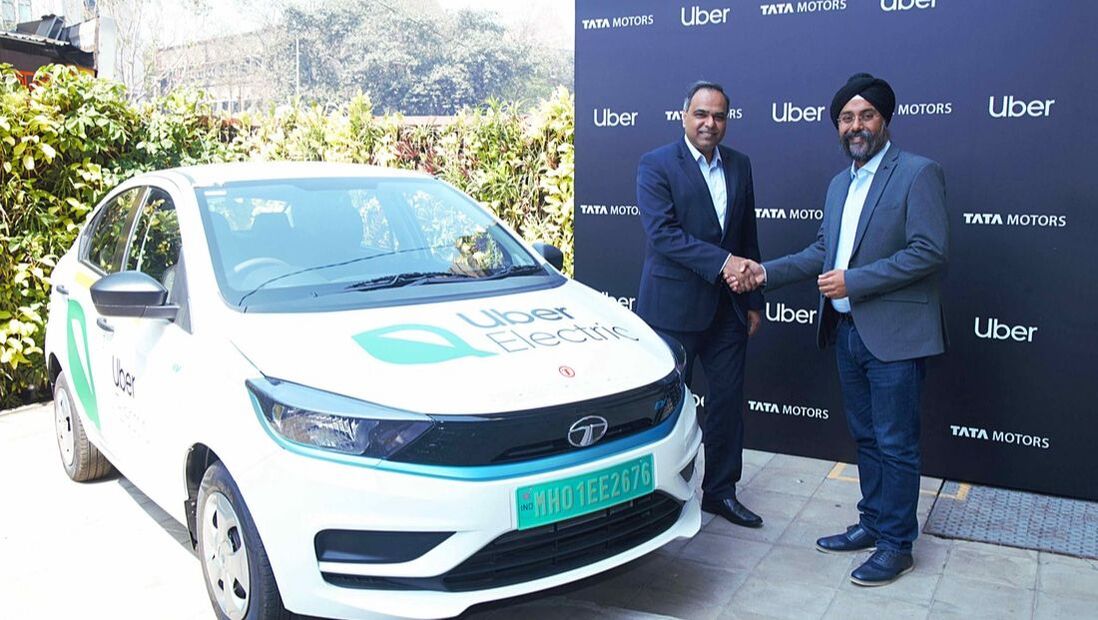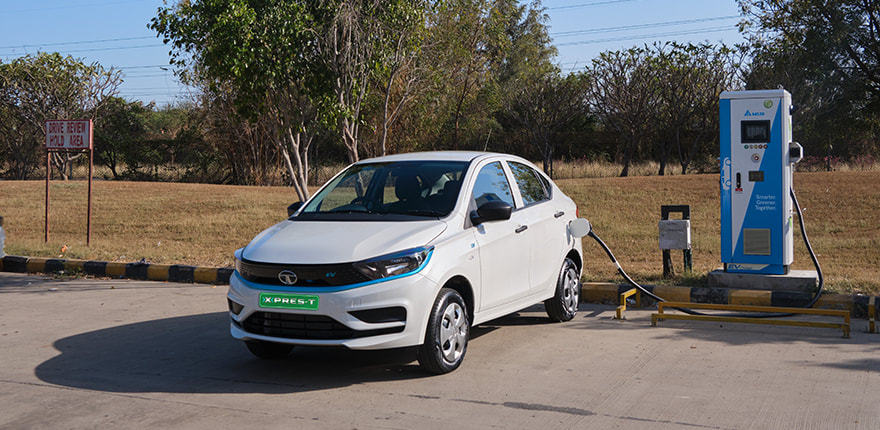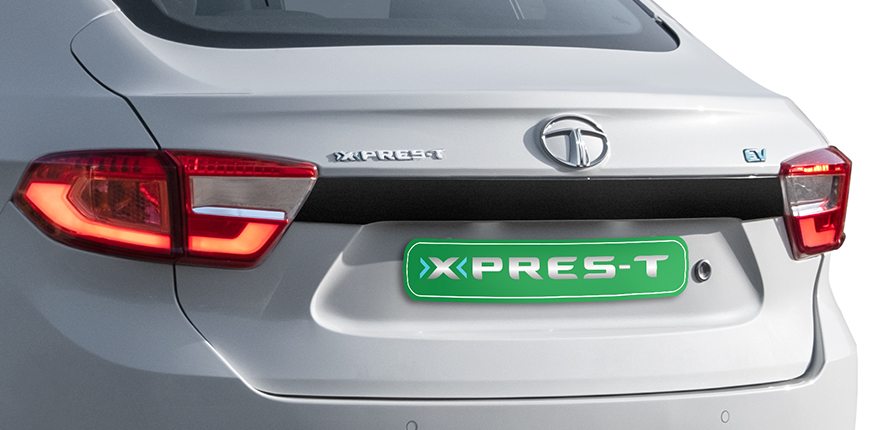Tata Motors, India’s leading automobile manufacturer and the pioneer of India’s EV evolution, today signed an MoU with Uber, India’s leading ridesharing app, to bring 25,000 XPRES–T EVs into their premium category service. Aligned towards its goal of a clean and green environment, Tata Motors will be aiding Uber in electrifying their services across Delhi NCR, Mumbai, Kolkata, Chennai, Hyderabad, Bengaluru and Ahmedabad. The Company will begin the deliveries of the cars to Uber fleet partners in a phased manner, starting this month.
Speaking at the MoU signing, Mr. Shailesh Chandra, MD, Tata Motors Passenger Vehicles and Tata Passenger Electric Mobility said, “In line with our commitment to grow sustainable mobility in the country, we are delighted to partner with Uber, India’s leading ridesharing platform. Offering customers our environmentally friendly EV ride experiences via Uber's Premium Category service, will accelerate the adoption of green and clean personal ride sharing. The XPRES-T EV is a very attractive option both for customers and operators. While enhanced safety, silent and premium in cabin experience provides the customers with a relaxed ride, the fast charging solution, driving comfort and the cost effectiveness of the EV makes it an attractive business proposition for our fleet partners. This partnership will further cement our market position in the fleet segment."
Commenting on the partnership, Mr. Prabhjeet Singh, President, Uber India and South Asia said, “Uber is committed to bringing sustainable, shared mobility to India, and this partnership with Tata Motors is a major milestone on that journey. It represents the largest EV partnership yet between an automaker and a ridesharing platform in India. It will supercharge the transition to zero emissions on the Uber platform as we work towards building a sustainable future. We are committed to doing our part to bring down the barriers to going electric by working with industry partners that are leading the change”.
Tata Motors has been revolutionizing the Indian automotive market with its pioneering efforts and is leading the e-mobility wave in India with over 50,000 Tata EVs rolled out from the plant to date in the personal and fleet segment. Furthermore, Uber has committed to 100% of rides taking place in zero-emission vehicles, on public transit, or with micro-mobility by 2040.
In July 2021, Tata Motors launched the ‘XPRES’ brand exclusively for fleet customers, and the XPRES-T EV is the first vehicle under this brand. The new XPRES-T electric sedan comes with 2 range options – 315km and 277km (ARAI certified range under test conditions). It packs a high energy density battery of 26 kWh and 25.5 kWh and be charged from 0- 80% in 59 mins and 110 mins respectively, using fast charging or can also be normally charged from any 15 A plug point, which is easily available and convenient. It comes with zero tail-pipe emission, single speed automatic transmission, dual airbags, and ABS with EBD as standard across variants. The premium interiors with standard automatic climate control and Electric Blue accents across its interior and exterior will give it a differentiated presence from other Tata cars.
Speaking at the MoU signing, Mr. Shailesh Chandra, MD, Tata Motors Passenger Vehicles and Tata Passenger Electric Mobility said, “In line with our commitment to grow sustainable mobility in the country, we are delighted to partner with Uber, India’s leading ridesharing platform. Offering customers our environmentally friendly EV ride experiences via Uber's Premium Category service, will accelerate the adoption of green and clean personal ride sharing. The XPRES-T EV is a very attractive option both for customers and operators. While enhanced safety, silent and premium in cabin experience provides the customers with a relaxed ride, the fast charging solution, driving comfort and the cost effectiveness of the EV makes it an attractive business proposition for our fleet partners. This partnership will further cement our market position in the fleet segment."
Commenting on the partnership, Mr. Prabhjeet Singh, President, Uber India and South Asia said, “Uber is committed to bringing sustainable, shared mobility to India, and this partnership with Tata Motors is a major milestone on that journey. It represents the largest EV partnership yet between an automaker and a ridesharing platform in India. It will supercharge the transition to zero emissions on the Uber platform as we work towards building a sustainable future. We are committed to doing our part to bring down the barriers to going electric by working with industry partners that are leading the change”.
Tata Motors has been revolutionizing the Indian automotive market with its pioneering efforts and is leading the e-mobility wave in India with over 50,000 Tata EVs rolled out from the plant to date in the personal and fleet segment. Furthermore, Uber has committed to 100% of rides taking place in zero-emission vehicles, on public transit, or with micro-mobility by 2040.
In July 2021, Tata Motors launched the ‘XPRES’ brand exclusively for fleet customers, and the XPRES-T EV is the first vehicle under this brand. The new XPRES-T electric sedan comes with 2 range options – 315km and 277km (ARAI certified range under test conditions). It packs a high energy density battery of 26 kWh and 25.5 kWh and be charged from 0- 80% in 59 mins and 110 mins respectively, using fast charging or can also be normally charged from any 15 A plug point, which is easily available and convenient. It comes with zero tail-pipe emission, single speed automatic transmission, dual airbags, and ABS with EBD as standard across variants. The premium interiors with standard automatic climate control and Electric Blue accents across its interior and exterior will give it a differentiated presence from other Tata cars.
PluginIndia's Take
The Tata XPRES-T is essentially the Tigor EV built on the low voltage 72V platform compared to the high voltage Ziptron platform used inside the regular Tigor EV. The XPRES-T has lower power (30 kW) and torque (105 Nm) numbers. This car also has two ports for charging AC-001 and a DC-001 GB/T connector. Regarding this deal with Uber, this is India's largest electric car deal at 25,000 units.
Now we are not sure how the Uber model will work here. Usually Uber does not own cars in India. In the west, Uber has a scheme called 'Xchange Leasing', which allows Uber to directly lease cars to its UberX drivers. UberX is the ride-sharing company’s cheapest ride service. Something like that may happen in India too. This makes sense as electrifying "their" fleet with the current no ownership model hinges on convincing Uber drivers to get behind the wheel of a new, electric car. Leasing a car makes more sense. Eliminating a petrol-powered ride-hail car should eliminate plenty of carbon—about three times more than electrifying a personal car, according to recent research from UC Davis.
This deal also will prove that the GB/T connector is not going anywhere! Fleet cars will continue to use electric cars with GB/T connectors.
Now, will we see less private cars now that we have so many EV's in Uber's fleet? Unfortunately that wont be the case in India. A research report released by Swiss investment bank UBS earlier this month said apps like Uber and Ola won’t deter Indians from buying their own, private cars.
Delhi NCR, Mumbai, Kolkata, Chennai, Hyderabad, Bengaluru and Ahmedabad cities will start getting these Tata XPRES-T's. So if you live in one of these cities, consider ditching OLA and ride an EV on Uber!!
The Tata XPRES-T is essentially the Tigor EV built on the low voltage 72V platform compared to the high voltage Ziptron platform used inside the regular Tigor EV. The XPRES-T has lower power (30 kW) and torque (105 Nm) numbers. This car also has two ports for charging AC-001 and a DC-001 GB/T connector. Regarding this deal with Uber, this is India's largest electric car deal at 25,000 units.
Now we are not sure how the Uber model will work here. Usually Uber does not own cars in India. In the west, Uber has a scheme called 'Xchange Leasing', which allows Uber to directly lease cars to its UberX drivers. UberX is the ride-sharing company’s cheapest ride service. Something like that may happen in India too. This makes sense as electrifying "their" fleet with the current no ownership model hinges on convincing Uber drivers to get behind the wheel of a new, electric car. Leasing a car makes more sense. Eliminating a petrol-powered ride-hail car should eliminate plenty of carbon—about three times more than electrifying a personal car, according to recent research from UC Davis.
This deal also will prove that the GB/T connector is not going anywhere! Fleet cars will continue to use electric cars with GB/T connectors.
Now, will we see less private cars now that we have so many EV's in Uber's fleet? Unfortunately that wont be the case in India. A research report released by Swiss investment bank UBS earlier this month said apps like Uber and Ola won’t deter Indians from buying their own, private cars.
Delhi NCR, Mumbai, Kolkata, Chennai, Hyderabad, Bengaluru and Ahmedabad cities will start getting these Tata XPRES-T's. So if you live in one of these cities, consider ditching OLA and ride an EV on Uber!!





